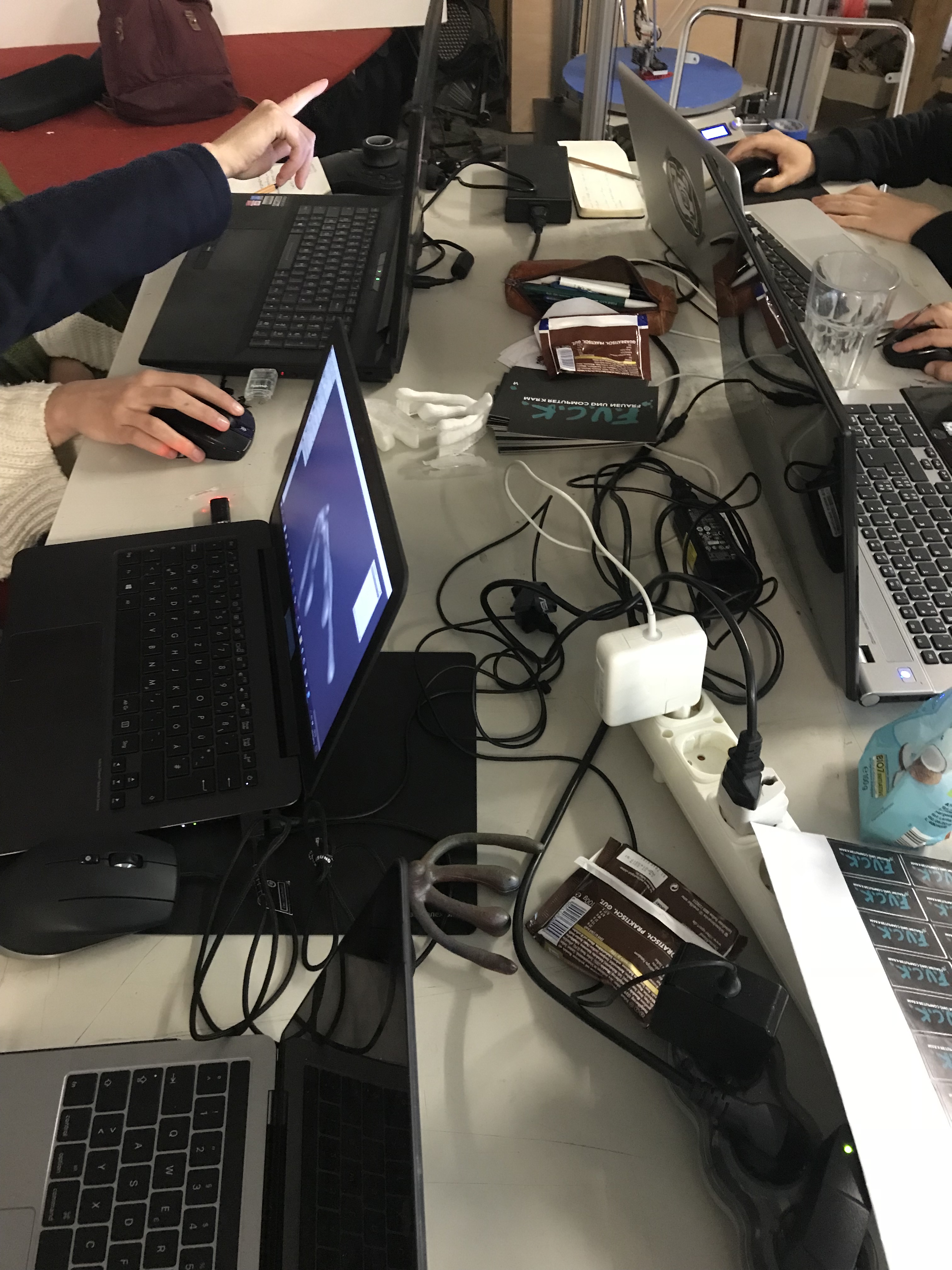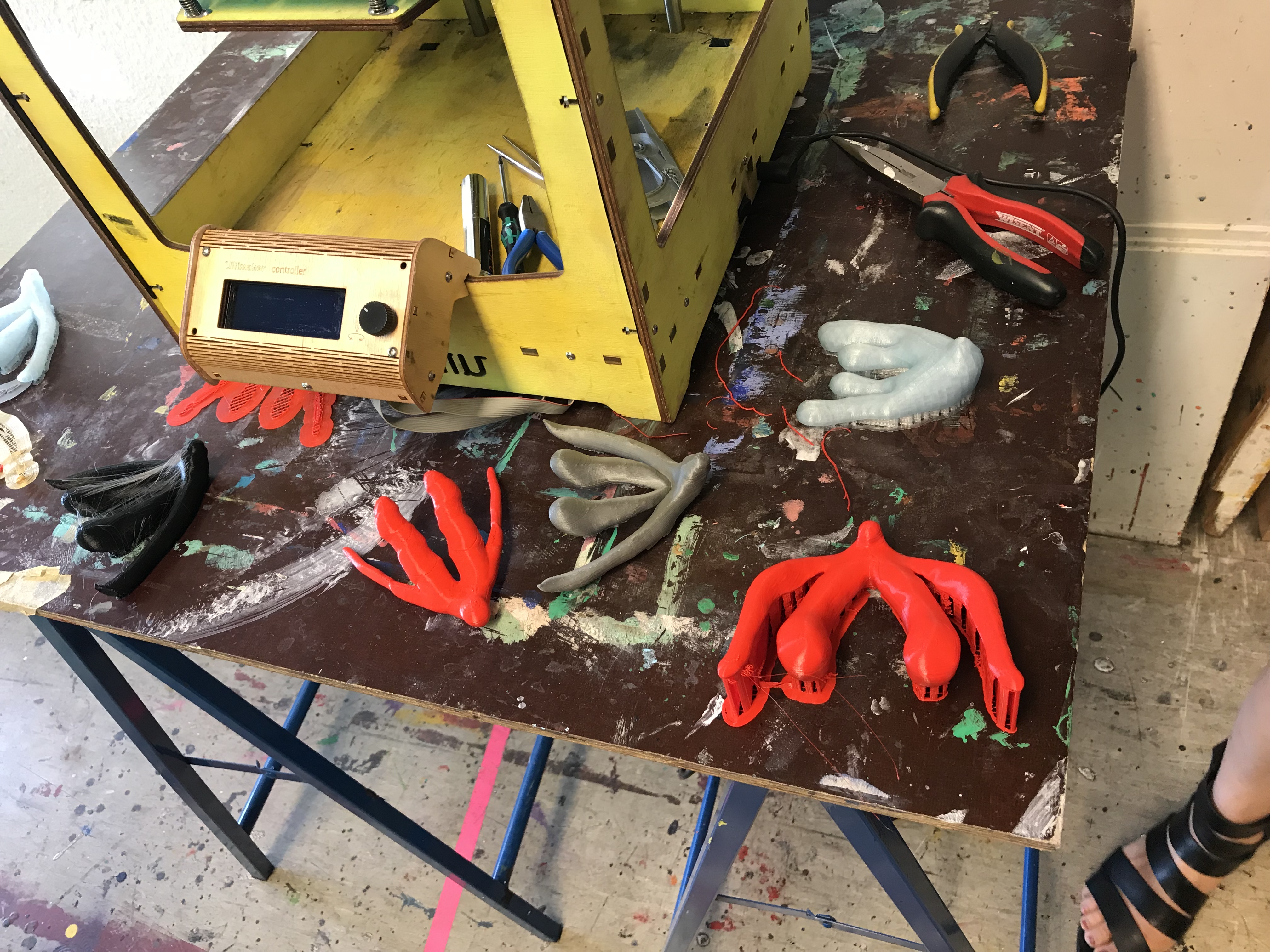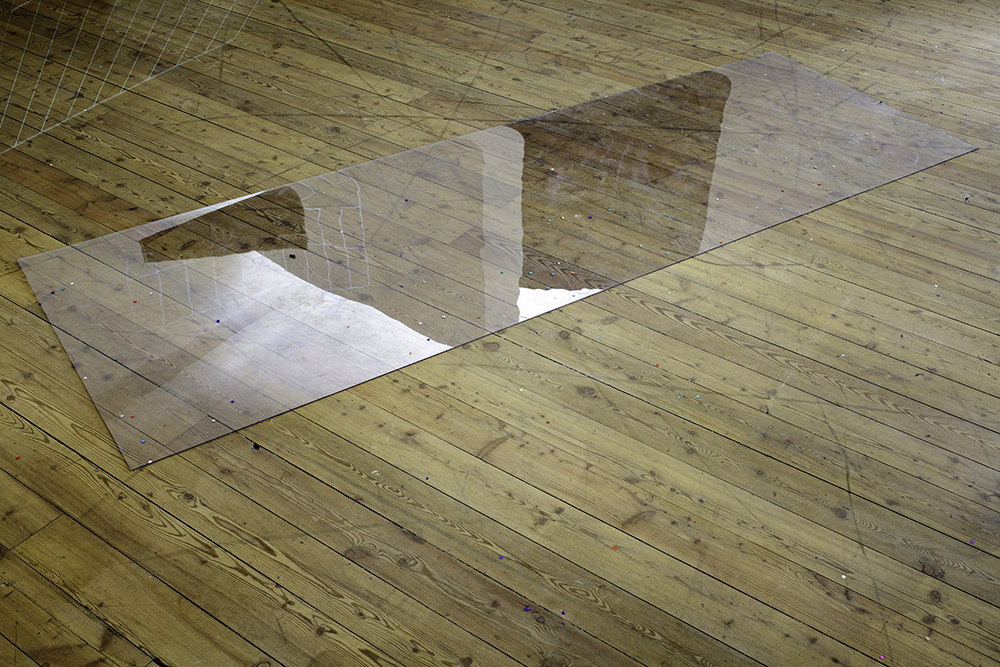Crop.
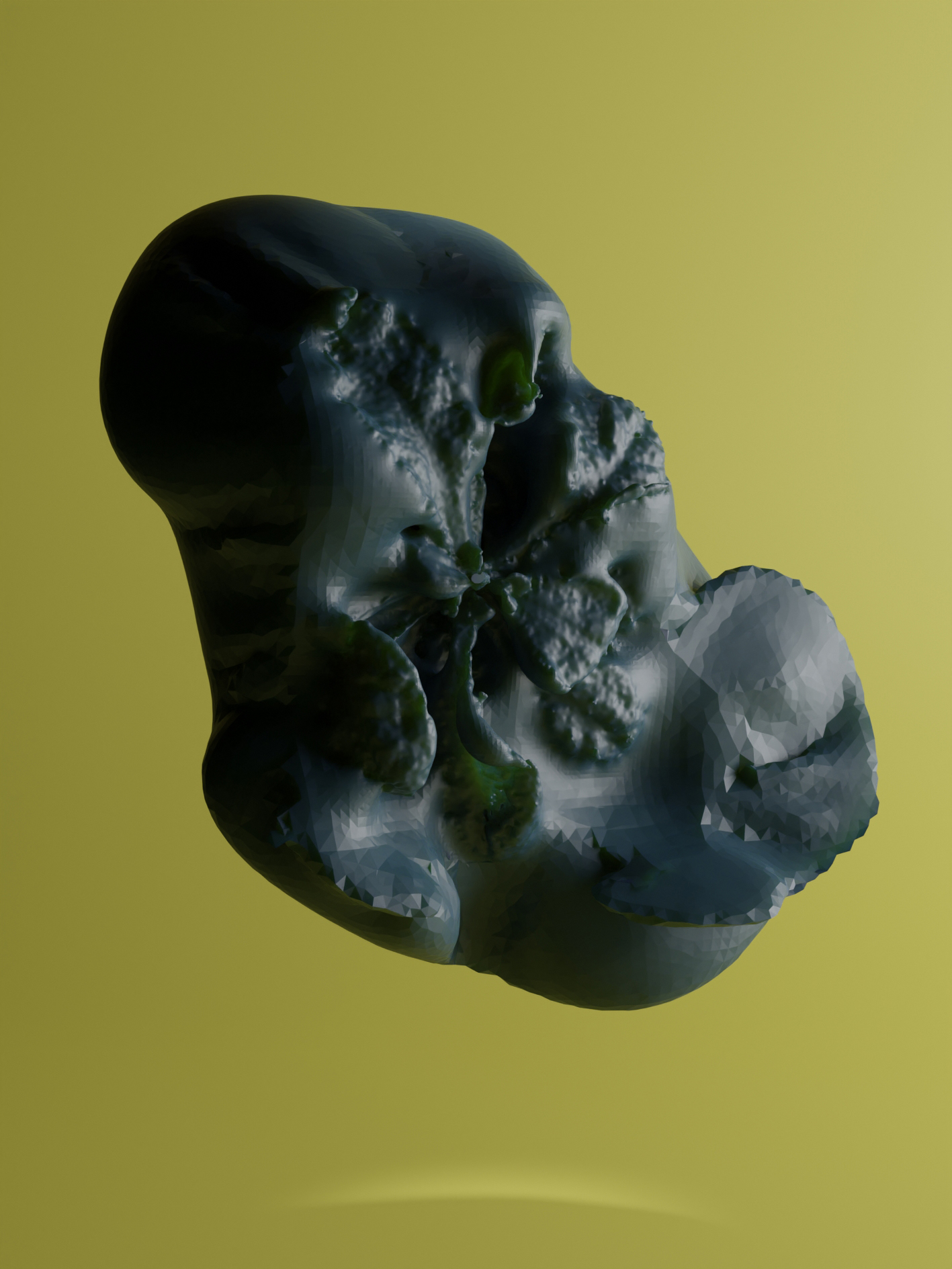

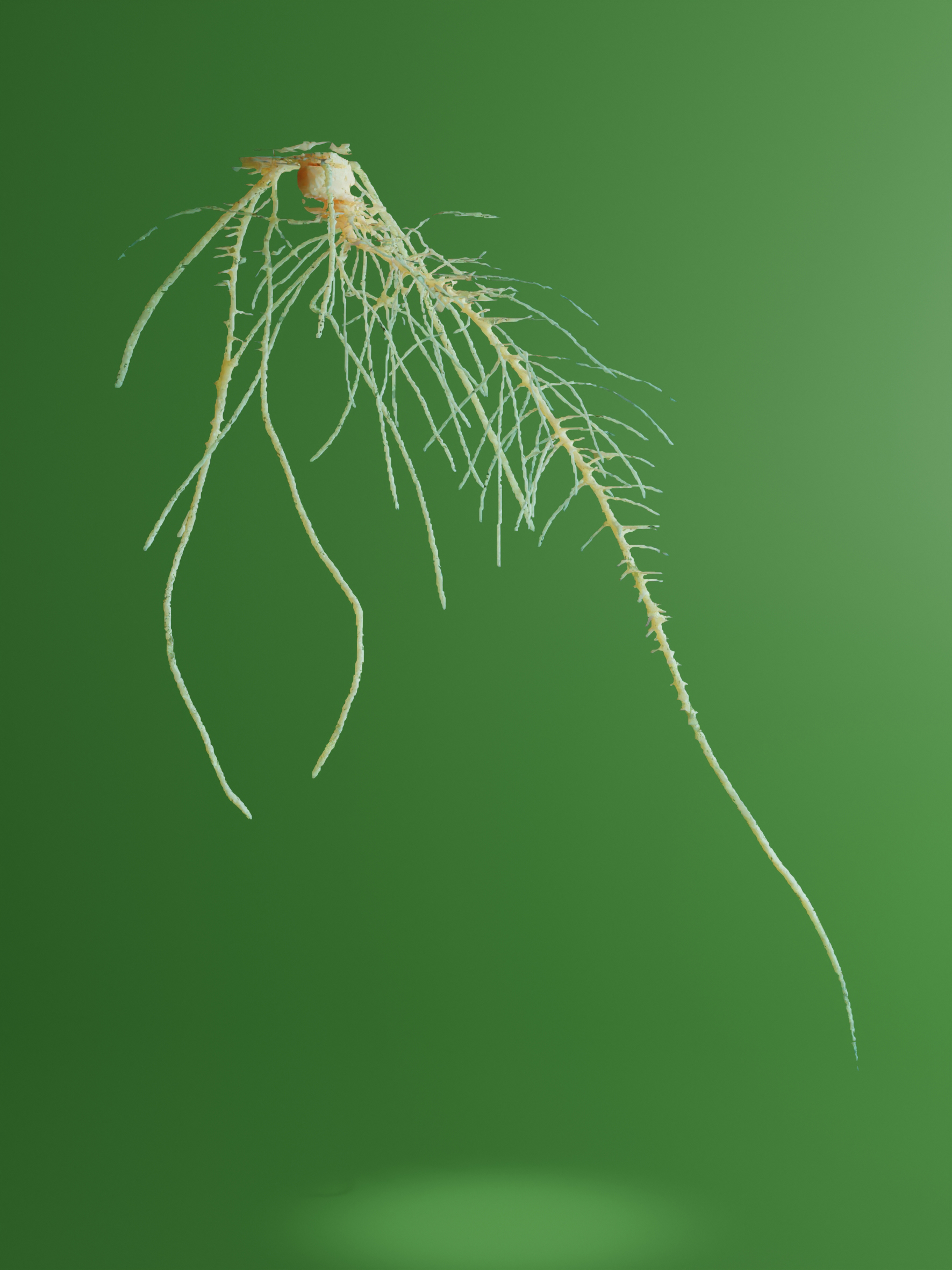
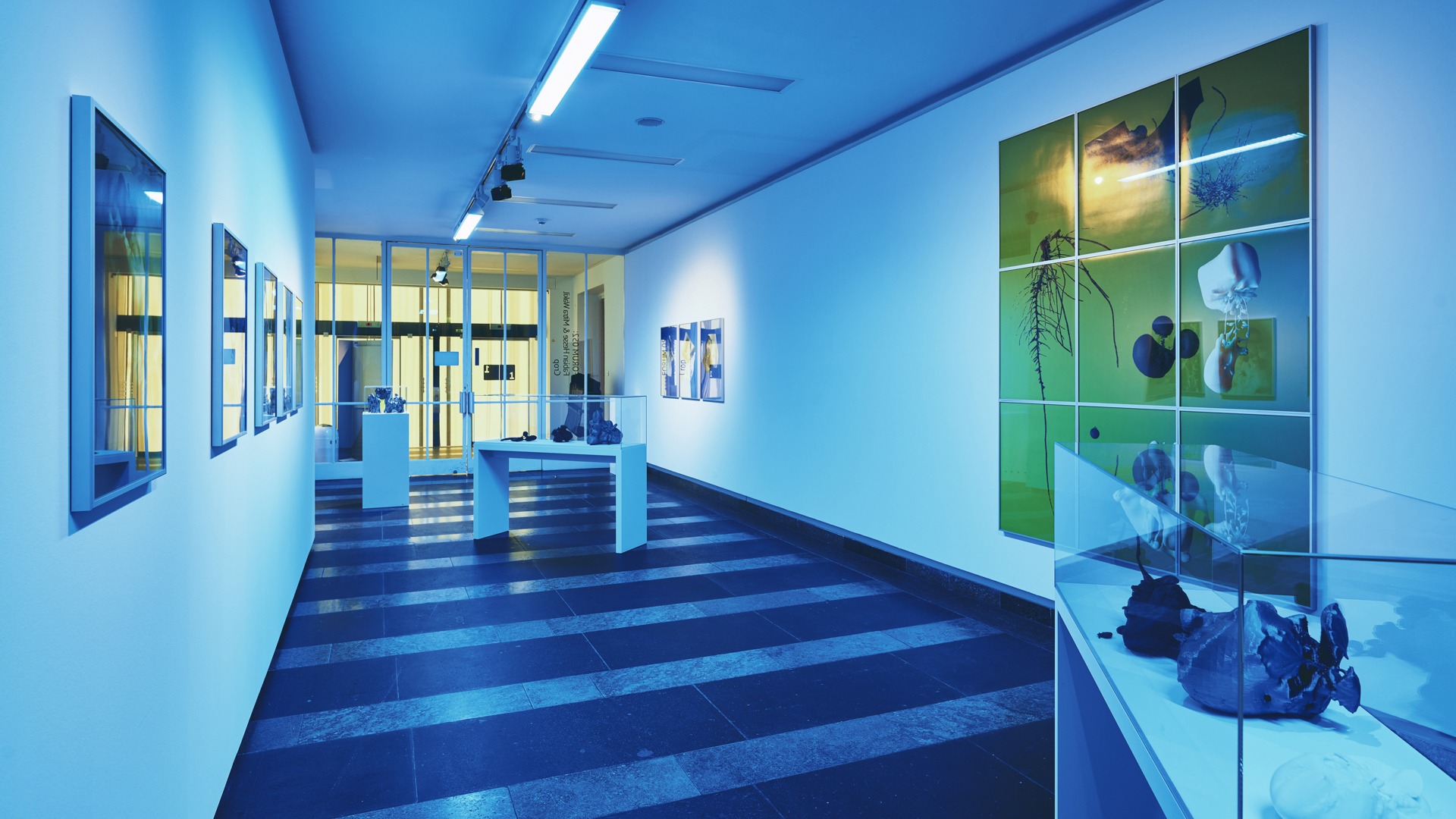
2019-2021
Series of renderings and 3D prints, different sizes
In their latest project, Hesse & Wakil are working with databases from biotechnology: specifically, they are using 3D scans of agricultural plants such as millet, tobacco, tomato plants and weeds such as field bindweed. These data collections study plant growth behavior under different climatic conditions. From an economic perspective, biotechnology appears to be a necessary way out of the man-made environmental crisis. But are Big Data and genetic engineering really suitable for countering the climate catastrophe, or do they in turn create new problems whose impact on nature is as yet unimaginable? For this series, whose title derives from the English „crop“ or „to crop“, Hesse & Wakil reorganize data from plant parts. They use specific algorithms and digital modeling to combine individual elements into new shapes. This gives rise to new, fantastic plant worlds – some of which appear floral, others humanoid. Their leaves, tubers and fruits merge to form surprising hybrids. In turn, Hesse & Wakil materialize the data sets generated from this process with the 3D printer as abstract sculptures in bioplastics and aluminum, lending their fictionalized representations a new object-like presence. By explicitly focusing on errors and communication breakdowns in the field of supposedly limitless optimization possibilities, Hesse & Wakil subvert the normative modes of functioning of perfect systems and make irregularities artistically useful. Thus, the works evoke doubts about a man-made and optimized nature, yet draw from the possibilities of a data- and technology-based botany. The 3D objects oscillate between nature and technology and elude dichotomous conceptual pairs such as natural and artificial. Crop traces the connection of disparate data sets to new entities as a central principle in Hesse & Wakil’s artistic practice. The exhibition situation invites to dive into the artistic design spaces of a technological and data-based concept of sculpture.
Text: Nadine Isabelle Henrich
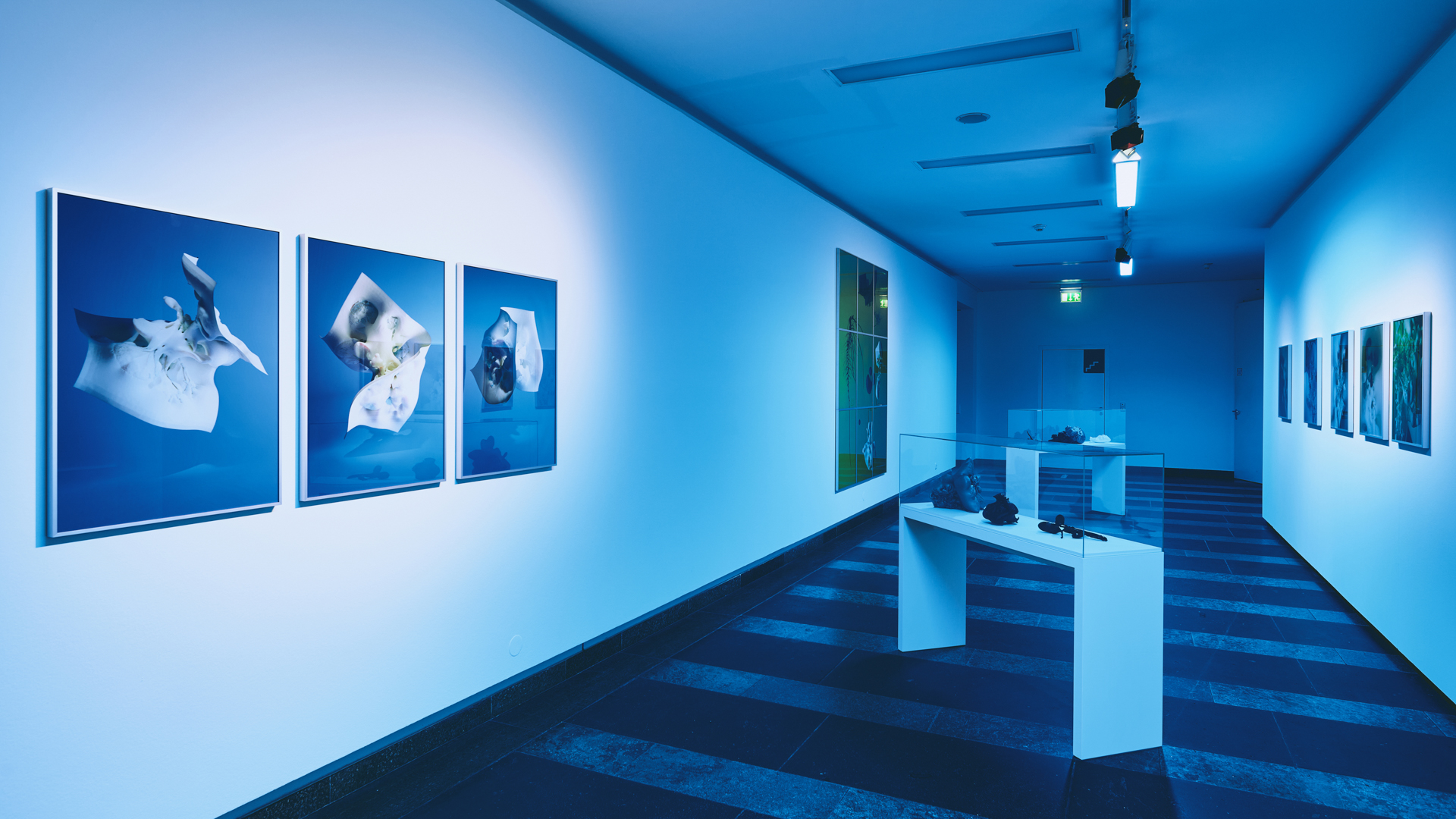
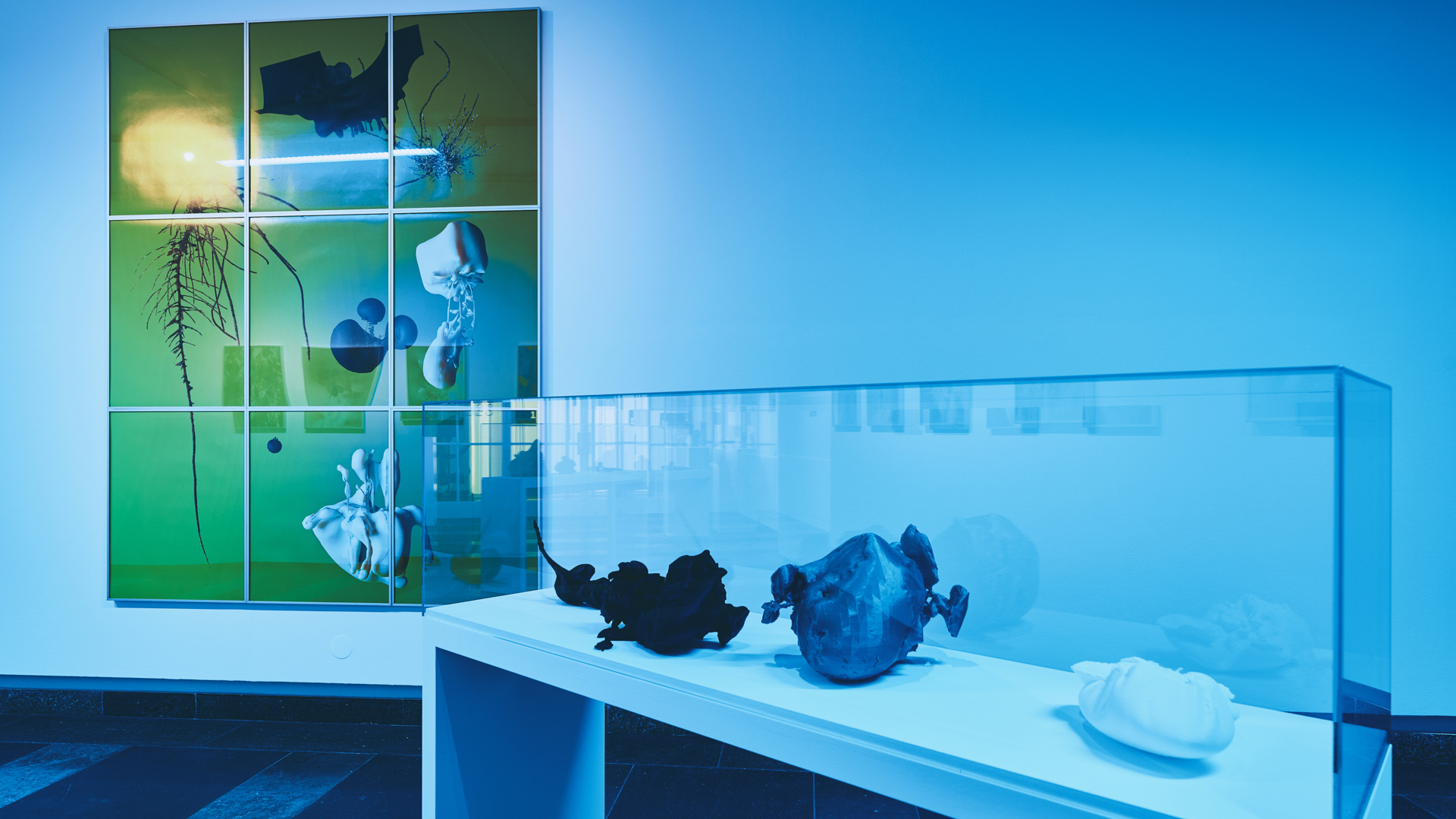
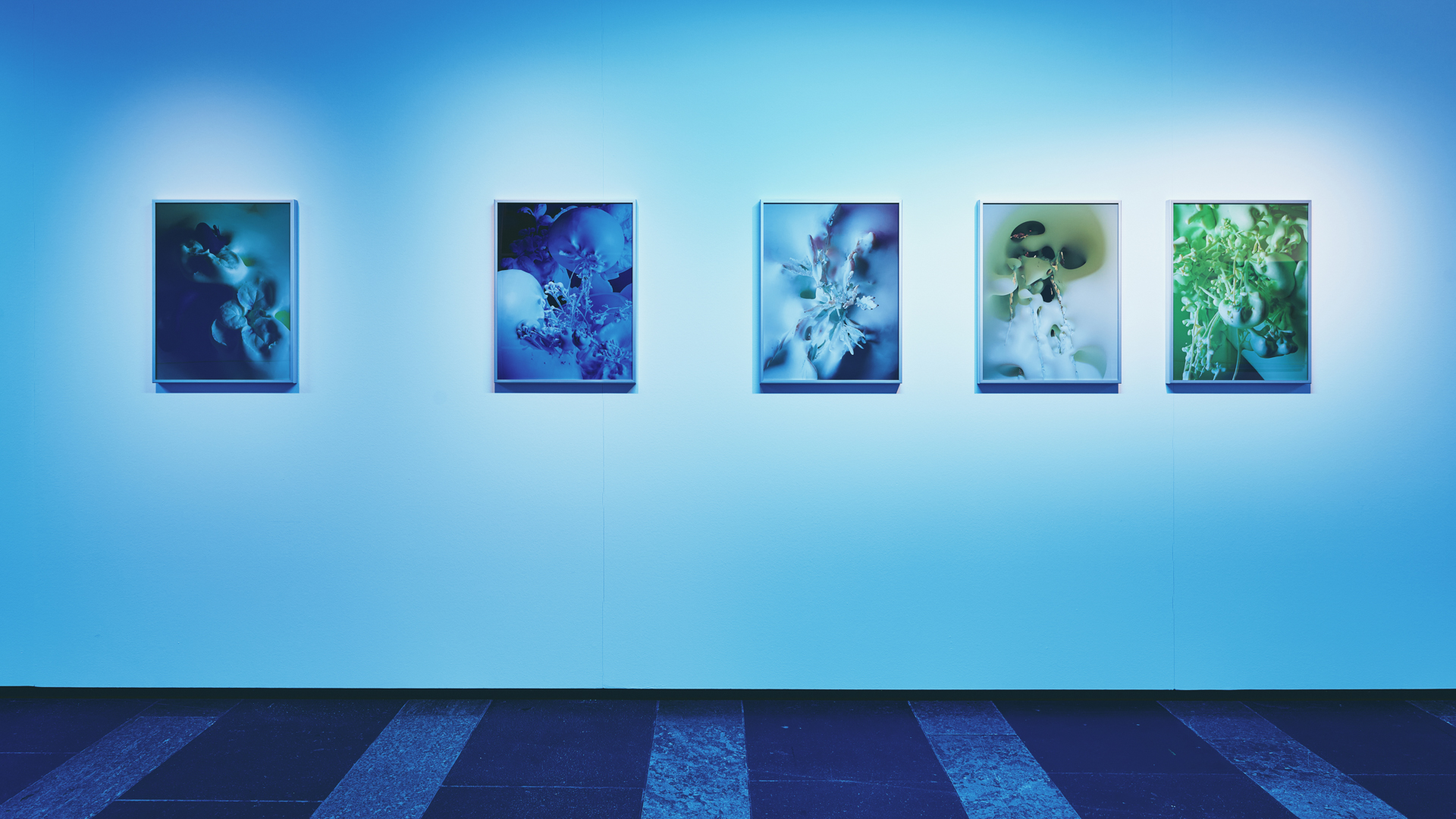
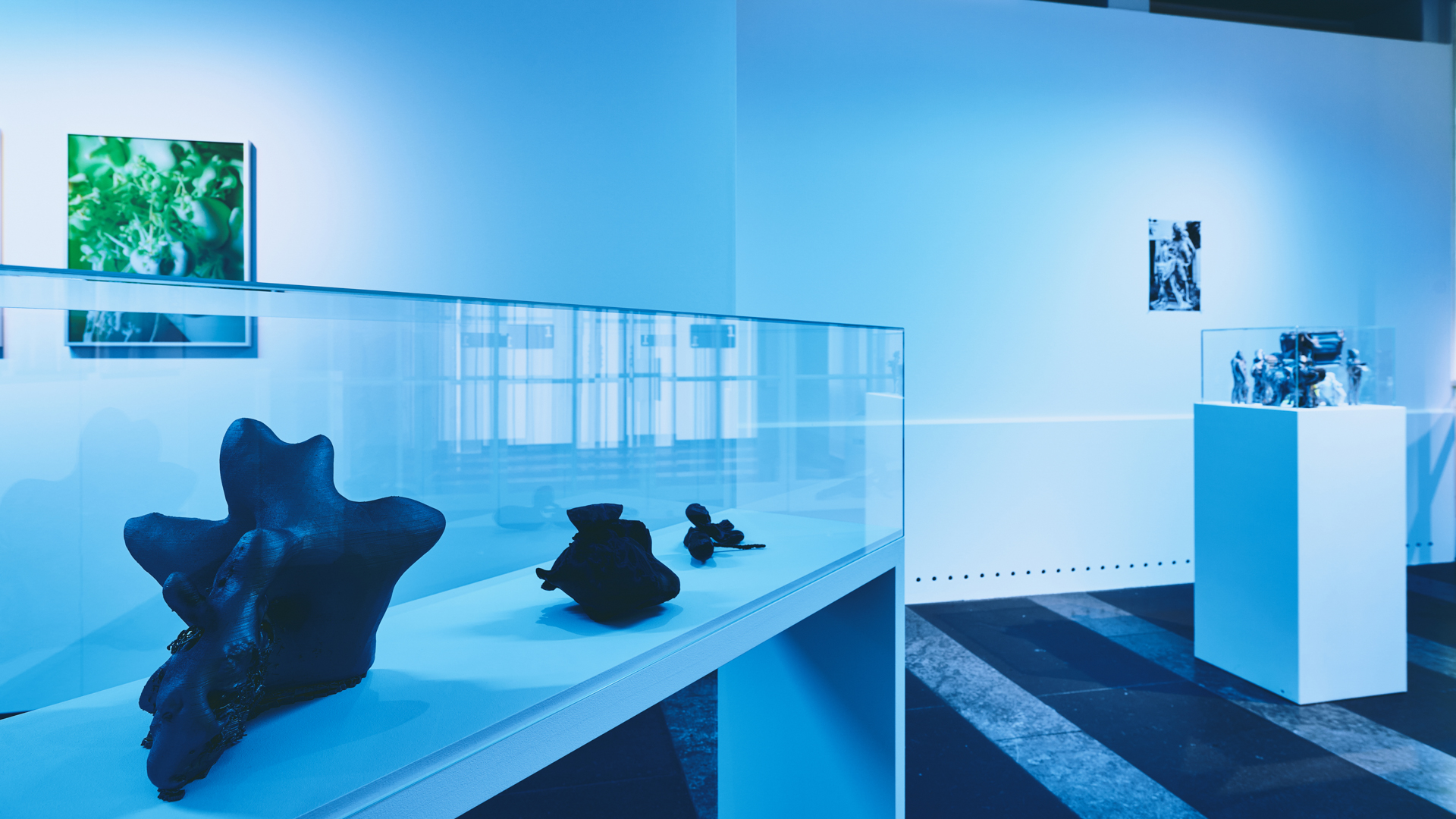
deutsch
Hesse & Wakil arbeiten in ihrem jüngsten Projekt für das Forum 052 mit Datenbanken aus der Biotechnologie: konkret nutzen sie 3D-Scans landwirtschaftlich genutzter Pflanzen wie Hirse, Tabak, Tomatenpflanzen und Beikräuter wie der Acker-Schmalwand. Diese Daten- sammlungen untersuchen das pflanzliche Wachstumsverhalten unter verschiedenen kli- matischen Bedingungen. Aus wirtschaftlicher Perspektive erscheint die Biotechnologie
als notwendiger Ausweg aus der vom Menschen verursachten Umweltkrise. Doch sind Big Data und Gentechnik tatsächlich geeignet, um der Klimakatastrophe zu begegnen, oder erzeugen sie wiederum neue Probleme, die in ihren Auswirkungen auf die Natur noch nicht vorstellbar sind?
Hesse & Wakil reorganisieren für die Ausstellung, deren Titel Crop sich vom englischen „crop“ wie dt. Ernte oder „to crop“ dt. wachsen/ ausschneiden herleitet, Daten von Pflanzen- teilen. Sie verbinden dabei einzelne Elemente mithilfe von Algorithmen und digitaler Mo- dellierung zu neuen Gestalten. So entstehen neue, phantastische Pflanzenwelten, die teils floral, teils humanoid wirken. Ihre Blätter, Knollen und Früchte verschmelzen zu überraschen- den Hybriden. Die aus diesem Prozess generierten Datensätze materialisieren Hesse & Wakil wiederum mit dem 3D-Drucker als abstrakte Skulpturen in Biokunststoffen und Aluminium und verleihen damit ihren fiktionalisierten Darstellungen eine neue objekthafte Präsenz.
Indem Hesse & Wakil im Feld vermeintlich grenzenloser Optimierungsmöglichkeiten explizit Fehler und Kommunikationsstörungen fokussieren, unterlaufen sie die normativen Funkti- onsweisen perfekter Systeme und machen Irregularitäten künstlerisch nutzbar. So evozieren die Arbeiten Zweifel an einer menschengemachten und –optimierten Natur und schöpfen dennoch aus den Möglichkeiten einer daten- und technologiebasierten Botanik. Die 3D Ob- jekte oszillieren zwischen Natur und Technik und entziehen sich dichotomen Begriffspaaren wie natürlich und künstlich.
Ergänzt wird die Ausstellung durch eine fotografische Dokumentation der zweiteiligen Skulpturengruppe Westpark Clouds (2016). In der Auftragsarbeit wurden in einem parti- zipativen Prozess 3D-Scans von Bewohner*innen des Viertels zu einem kollektiven Bildnis zusammensetzt. Die Bewohner*innen der Anlage hatten die Möglichkeit, sich mittels 3D- Technologie scannen zu lassen, um ein gedrucktes, dreidimensionales Porträt ihrer selbst in Form einer kleinen Büste zu erhalten. Ausgewählte Daten verwendeten die Künstler*innen anschließend, um eine lebensgroße zweiteilige Skulptur aus Aluminium herzustellen: Colla- geartig zusammengeführte Einzelporträts, im Modellierungsprozess überlagert, skaliert und verzerrt, verleihen ihr eine Anschauung, die realistische und abstrakte Elemente verknüpft.
Crop zeichnet die Verbindung disparater Datensätze zu neuen Einheiten als zentrales Prinzip in der künstlerischen Praxis von Hesse & Wakil nach. Die Ausstellung lädt dazu ein in die künstlerischen Gestaltungsräume eines technologischen und datenbasierten Skulpturbe- griffs einzutauchen.
Text: Nadine Isabelle Henrich
As we
conclude from recent observations, it would seem as if production and practice
in the context of contemporary art and
related theory are increasingly adopting a specific formatting.
The dominant features include:
1) individual authorship claims
2) conceptual-discursive explanations of the world
3) increasingly hermetic academic-professional expertise
This is not a good development, in our opinion. Thus it seems more
than appropriate that we once again put ourselves in situations in which we can re-examine our personal motivations and the formal circumstances of our production and practice; in other words, the conditions in which we think, act, produce, and ultimately live. To this end, we and our guests will attempt to find formal set-ups that help us to grasp this complex with means other than language. Let’s see where this leads us.
Participants: NO FUTURE Komplex ( Mitra Wakil, Stephan Janitzky, Sebastian Stein, Anne Faucheret, Michael Dobrindt) together with a broad range of friends and invited guests (Kerstin Stakemeier, Mattin, Marina Vishmidt)
Deutsch
Wie unsere rezenten Beobachtungen ergeben haben, scheint es, als würden Produktion und Praxis im Kontext der zeitgenössischen Kunst und der dazu in Beziehung stehenden Theorie immer mehr eine bestimmte Formatierung annehmen. Darin dominieren
1) individuelle Autorschaftsclaims
2) konzeptuell-diskursives Erklären von Welt
3) ein immer hermetischer werdendes akademisch-professionelles Expertentum
Diese Entwicklung finden wir nicht gut. Und so erscheint es uns mehr als angebracht, uns wieder einmal in Situationen zu bringen, in denen wir unsere persönlichen Motivationen und die formalen Umstände unserer Produktion und Praxis, d.h. die Bedingungen, unter denen wir denken, agieren, produzieren und letztlich auch leben, aufs Neue überprüfen können. Hierzu werden wir auch zusammen mit unseren Gästen versuchen, formale Anordnungen zu finden, um diesem Komplex auch noch auf andere als sprachliche Weise auf die Schliche zu kommen. Wir werden sehen, wohin uns das führen wird.
TeilnehmerInnen: NO FUTURE Komplex (Mitra Wakil, Stephan Janitzky, Sebastian Stein, Anne Faucheret, Michael Dobrindt) zusammen mit einem weitgefassten freundschaftlichen
Zusammenhang und eingeladenen Gästen
(Kerstin Stakemeier, Mattin, Marina Vishmidt).
related theory are increasingly adopting a specific formatting.
The dominant features include:
1) individual authorship claims
2) conceptual-discursive explanations of the world
3) increasingly hermetic academic-professional expertise
This is not a good development, in our opinion. Thus it seems more
than appropriate that we once again put ourselves in situations in which we can re-examine our personal motivations and the formal circumstances of our production and practice; in other words, the conditions in which we think, act, produce, and ultimately live. To this end, we and our guests will attempt to find formal set-ups that help us to grasp this complex with means other than language. Let’s see where this leads us.
Participants: NO FUTURE Komplex ( Mitra Wakil, Stephan Janitzky, Sebastian Stein, Anne Faucheret, Michael Dobrindt) together with a broad range of friends and invited guests (Kerstin Stakemeier, Mattin, Marina Vishmidt)
Deutsch
Wie unsere rezenten Beobachtungen ergeben haben, scheint es, als würden Produktion und Praxis im Kontext der zeitgenössischen Kunst und der dazu in Beziehung stehenden Theorie immer mehr eine bestimmte Formatierung annehmen. Darin dominieren
1) individuelle Autorschaftsclaims
2) konzeptuell-diskursives Erklären von Welt
3) ein immer hermetischer werdendes akademisch-professionelles Expertentum
Diese Entwicklung finden wir nicht gut. Und so erscheint es uns mehr als angebracht, uns wieder einmal in Situationen zu bringen, in denen wir unsere persönlichen Motivationen und die formalen Umstände unserer Produktion und Praxis, d.h. die Bedingungen, unter denen wir denken, agieren, produzieren und letztlich auch leben, aufs Neue überprüfen können. Hierzu werden wir auch zusammen mit unseren Gästen versuchen, formale Anordnungen zu finden, um diesem Komplex auch noch auf andere als sprachliche Weise auf die Schliche zu kommen. Wir werden sehen, wohin uns das führen wird.
TeilnehmerInnen: NO FUTURE Komplex (Mitra Wakil, Stephan Janitzky, Sebastian Stein, Anne Faucheret, Michael Dobrindt) zusammen mit einem weitgefassten freundschaftlichen
Zusammenhang und eingeladenen Gästen
(Kerstin Stakemeier, Mattin, Marina Vishmidt).

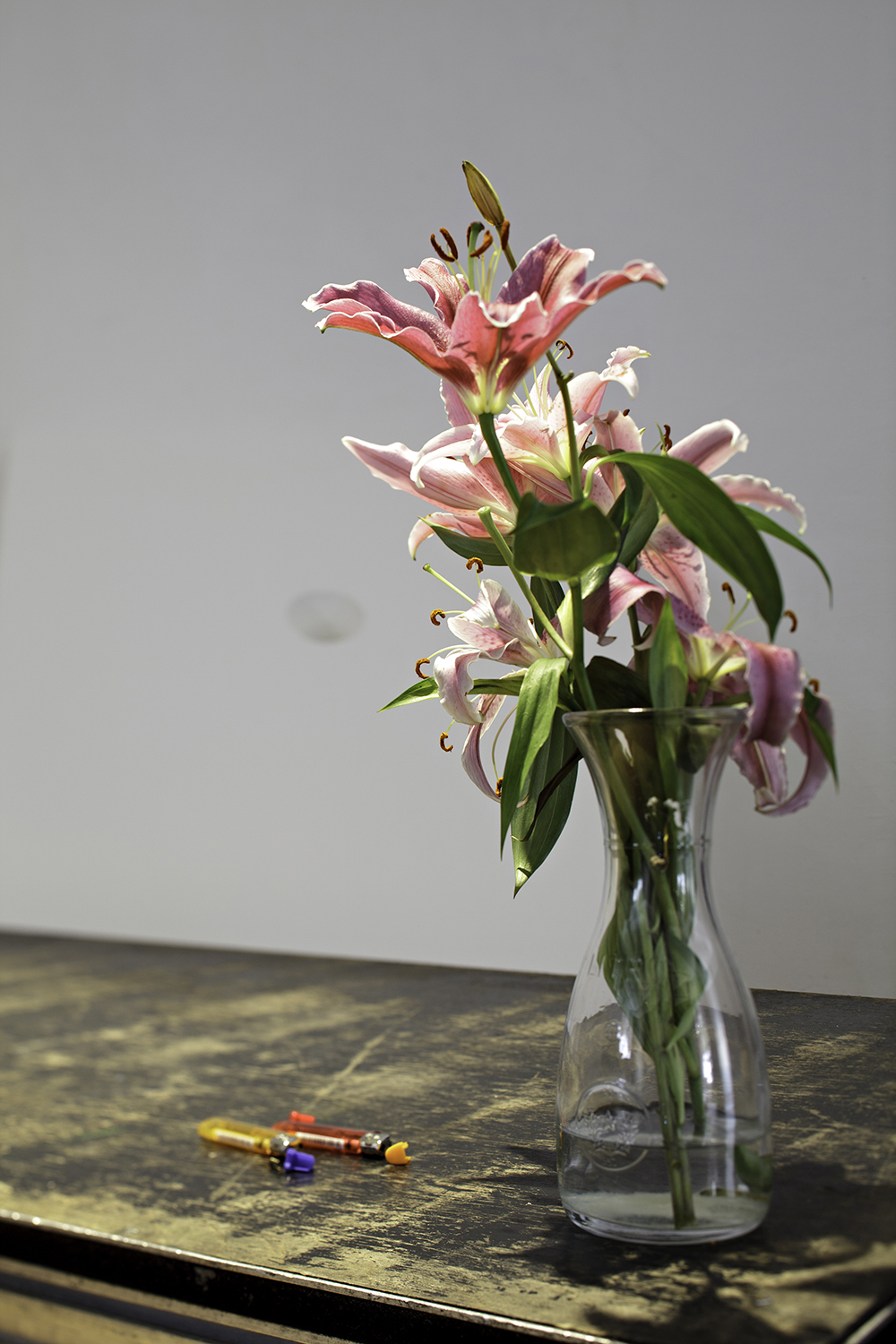
NO FUTURE Komplex
Foutue
2017
Kunstverein Göttingen

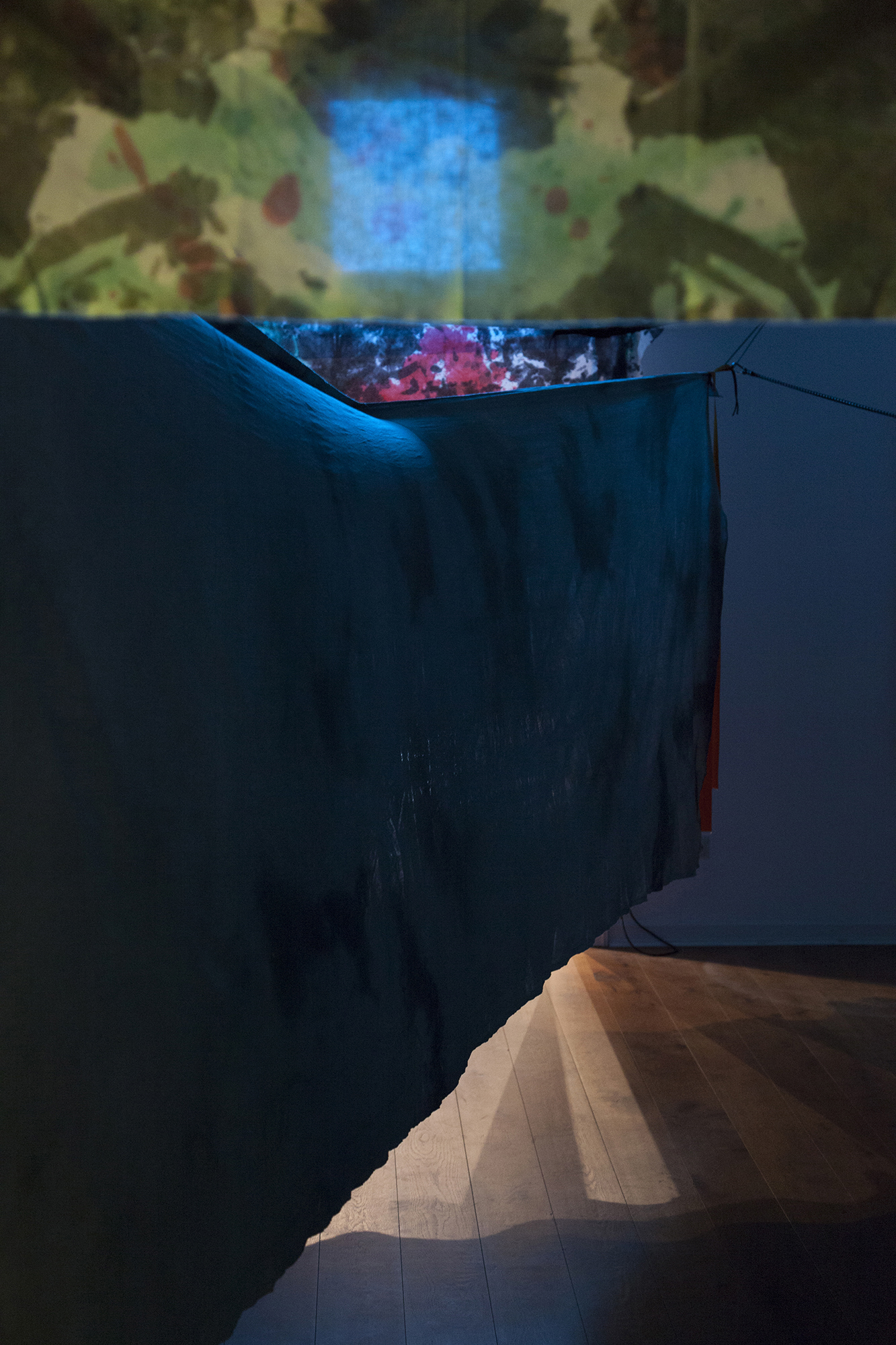




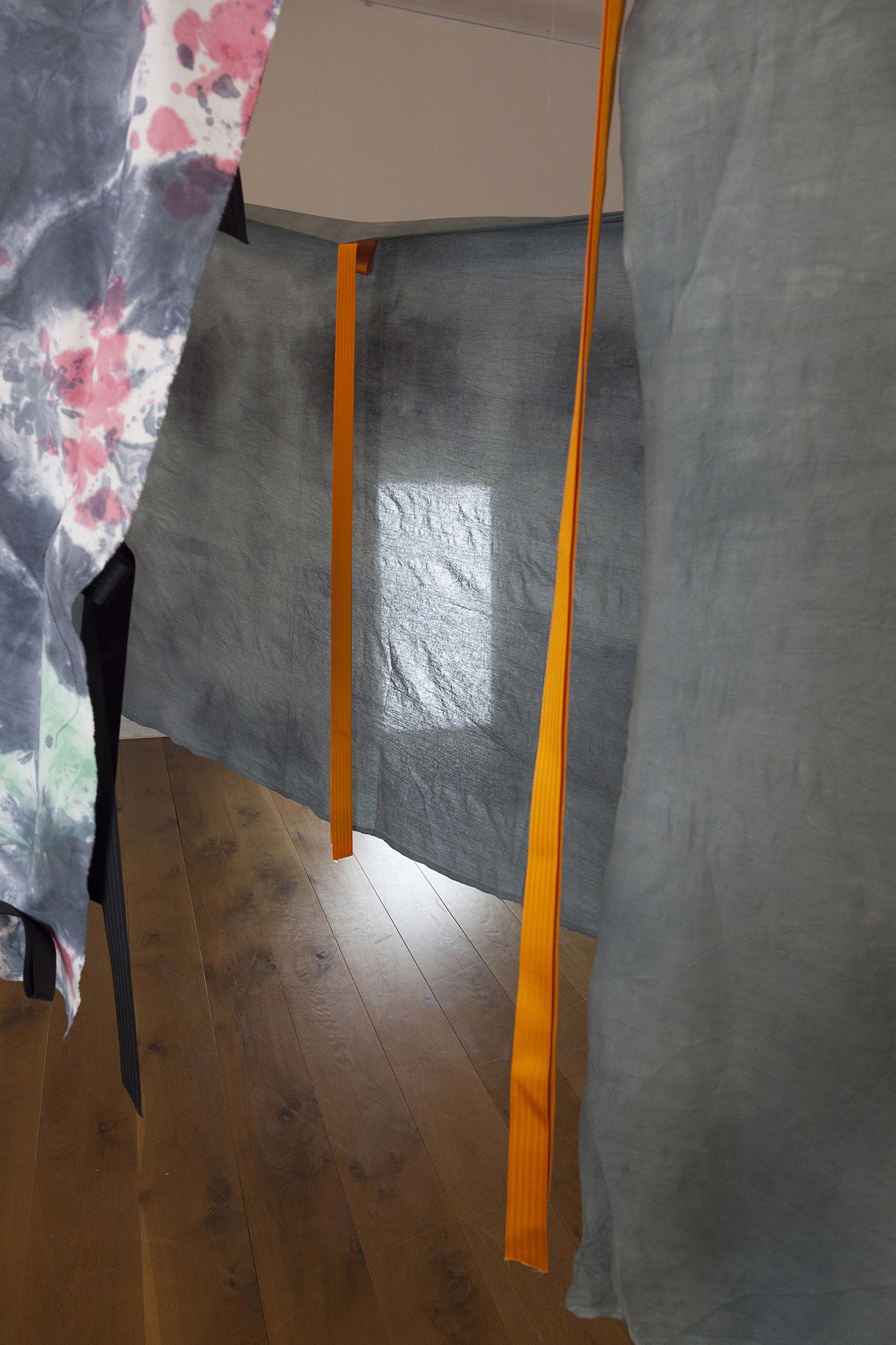
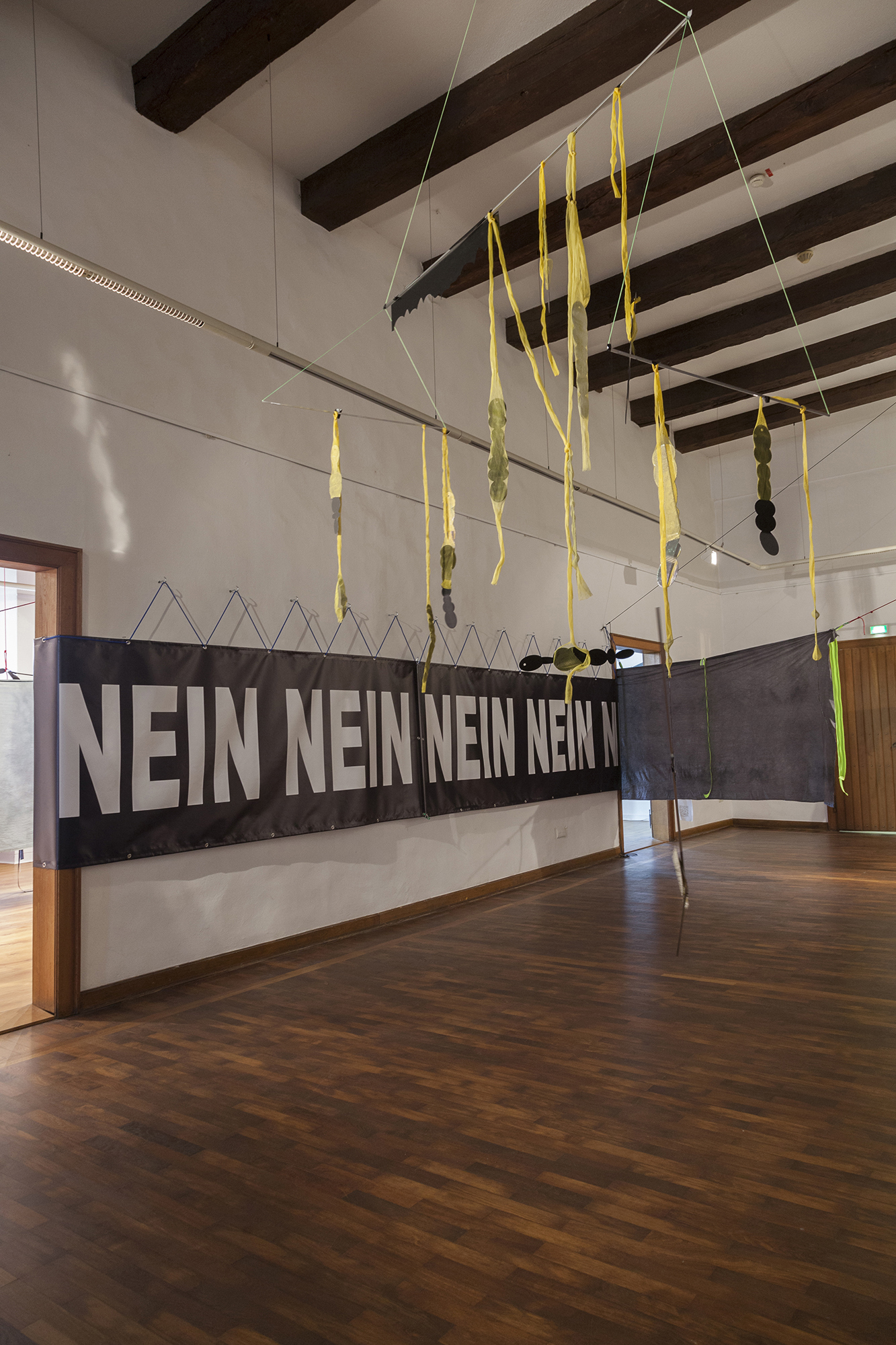


Under the label NO FUTURE KOMPLEX Mitra Wakil, Stephan Janitzky, and Sebastian Stein, along with a broader context developed in friendship, are currently training for an assault on hermetic formats in the context of contemporary art and correlated theory production. The starting point was the series of workshops “NO FUTURE: bourgeois escapism and preaching to the converted” in November 2011 at Lothringer13_Laden, an art space in Munich, co-organized by Mitra Wakil, Stephan Janitzky, and Sebastian Stein from 2011 until around 2014.
Deutsch
Unter dem Label NO FUTURE KOMPLEX trainieren zurzeit Mitra Wakil, Stephan Janitzky und Sebastian Stein mit einem weiter gefassten, freundschaftlichen Zusammenhang den Angriff auf hermetische Formatierungen im Kontext der zeitgenössischen Kunst und der dazu in Beziehung stehenden Theorieproduktion. Ausgangspunkt war die Workshopreihe »NO FUTURE: bourgeois escapism and preaching to the converted« im November 2011 im Lothringer13_Laden, einem Kunstraum in München, den Mitra Wakil, Stephan Janitzky und Sebastian Stein von 2011 bis ca. 2014 mitorganisierten.

Worlding – nudges for posthuman play. Anstoß zum Weltenbauen
Akademie Schloss Solitude & Werkstatthaus Stuttgart, 2019
The event is initiated by Sahej Rahal in collaboration with Mitra Wakil and Fabian Hesse.
Cyberpunk Performances, Collective Life-Gaming Tutorial, Filmscreening on Ecologies, Post-Truth Conversation
How do we practice »Worlding« in the crappy present? Between the wreckage of co-working spaces and Amazon’s social networks which create bacteria from data and facts from lies? Seeking super solidarities in the age of mass-mining micro-feelings.
Akademie Schloss Solitude calls fellow (post-)humans, cyberpunks, 3D scanner shamans, and tentacular artificial intelligences to join us in a game of worldbuilding: in a two-day session, Stuttgart’s Werkstatthaus will transform into an experimental space with open conversations, film screenings, objects, a collective life-gaming tutorial, and a performance on rituals for cyberpunks.
Day 1
Animal Hacker Analytics: Queer encounters with dark arts, shimmering endurances and toxic execution
Keynote lecture by Helen Pritchard
Day 2
Worlding with Hivemind
Collective tutorial on worldbuilding, guided by Sahej Rahal
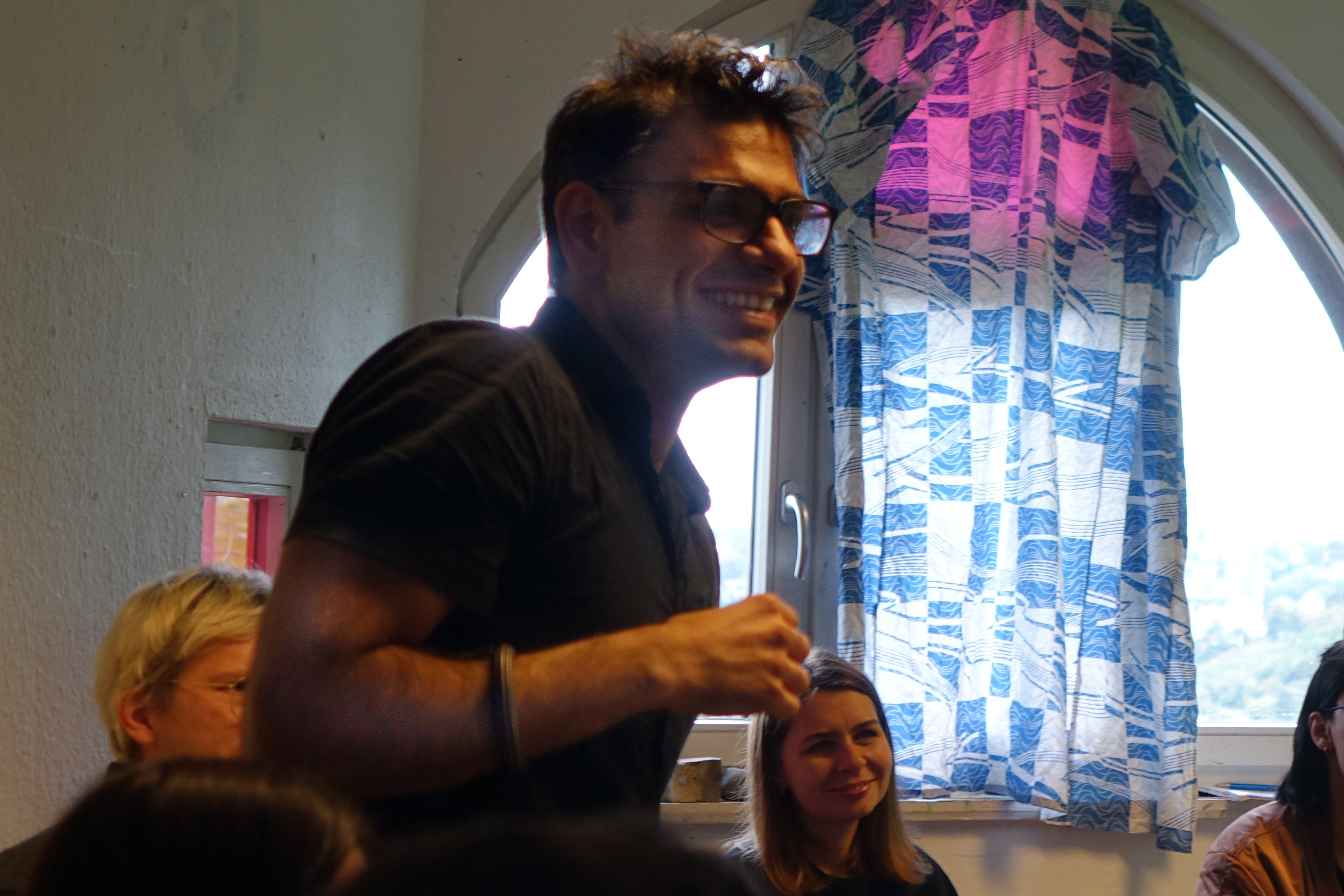
In this tutorial, participants are invited to collaboratively design speculative worlds, working with 3D scanning, video-game programs & MIDI sound generators.
 Toxic Truth Terrain
Toxic Truth TerrainConversation with Helen Pritchard, Pallavi Paul, and Matthias Böttger
In this conversation, the participants are invited to explore the question »How does a world constitute itself?«. The discussants will approach the question from three vantage points, namely the negotiation of facticity and reality in the formation of contemporary truth (Pallavi Paul), the relation of video-games and urbanism (Matthias Böttger), and the toxicity of computational ecologies (Helen Pritchard).
Tentacular Plastic Realism
Conversation with Mitra Wakil, Fabian Hesse, and Daniel Rourke

The conversation partners are invited to engage and entangle with »crapularity« – a term described as the opposite of »singularity« by Florian Cramer in his text »Crapularity Aesthetics« (2019) – by exploring the subversive potential of playing with plastic through 3D scanning and 3D printing technologies (Fabian Hesse & Mitra Wakil) and worlding with the materiality of horror (Daniel Rourke).
Collective Performance
________________________
With contributions by:
Matthias Böttger, architect, Berlin/Germany; Fabian Hesse, artist, HFBK Hamburg, Digital/Material Workshop, Berlin/Germany;
Pallavi Paul, artist, New Delhi/India;
Helen Pritchard, artist and lecturer in Computational and Digital Arts at Goldsmiths, University of London, London/Great Britain;
Sahej Rahal, artist, Mumbai/India;
Mitra Wakil, artist,
Daniel Rourke, lecturer and co-convener of the MA in Digital Media at Goldsmiths, University of London, London/Great Britain;
3D Clit
Seit 2016 initiiert Mitra Wakil eine Reihe von Workshops, um die Historie, Biologie und künstlerische Spekulationen zum Organ der Klitoris zu thematisieren. Die Klitoris ist aus historischen und politischen Gründen bis in die Gegenwart hinein ein wenig bekanntes Organ. Davon ausgehend werden Fragen zu Technologie und Wissenschaft, und deren Involvierung in patriarchale Machtverhältnisse betrachtet. Normen und Codes von Geschlechterkonstruktionen und Wertschöpfungsmechanismen des menschlichen Körpers in der digitalen Gesellschaft werden hinterfragt.
Mitra Wakil versucht in einer kollektiven Situation diesen Themen zu begegnen - zwischen politischem Aktivismus und kritischen Technologieverständnis - und mit den Mitteln der Kunst. Wakil sieht sich in diesem Setting als Organisatorin, Künstlerin und Teil einer Diskussions- und Lerngruppe. Die Treffen finden in Schulen, Fablabs, Hackerspaces, zusammen mit Sexualerziehern, Medizinerinnen und selbstorganisierten feministischen Gruppen statt. In den Workshops lädt die Künstlerin dazu ein, 3D-Modelle einer Klitoris zu erstellen - sei es als anatomisches Modell, das dem Original entspricht oder als organische Spekulation. Es geht nicht nur darum digitale Fabrikation kennenzulernen und anzuwenden, sondern der eigenen Involvierung in digitale Infrastrukturen gewahr zu werden. Die Modelle werden 3D gedruckt und den Teilnehmer*innen übergeben, und können als Lernobjekte in verschiedene Kontexten gebracht werden. Sie sollen Einzug finden an Orten, in denen Bewusstseinsbildung stattfindet und Normen zu Körperpolitiken geprägt werden - wie beispielsweise Schulen, Frauenhäusern und Museen.
